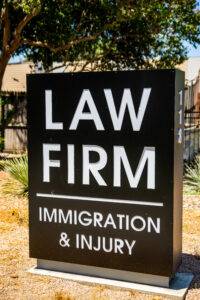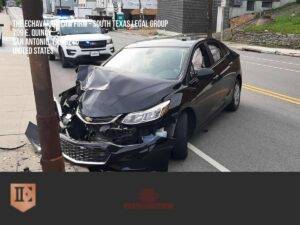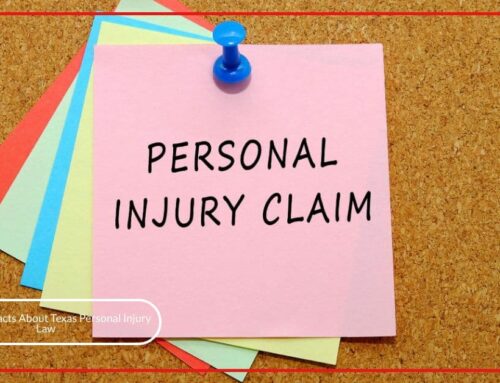In the state of Texas, it’s important to understand that motorists hold complete responsibility for any injuries caused by their vehicles. This responsibility applies even when third-party negligence is involved. Consequently, those who have suffered harm due to a collision cannot legally pursue the individual they believe to be at fault unless that individual can irrefutably establish their innocence in the matter.
The Echavarria Law Firm in San Antonio, Texas, is a legal professional who specializes in providing assistance and representation to individuals involved in car accidents. They help navigate legal processes, negotiate with insurance companies, and seek compensation for damages and injuries resulting from car accidents in the San Antonio area.

personal injury attorney in san antonio
Get Car Accident Injury Help
Are you seeking immediate legal assistance following a car accident? The Echavarria Law Firm is your trusted partner in negotiating with insurance companies, securing fair compensation for serious motor vehicle crash injuries, and ensuring that irresponsible drivers are held accountable for their actions. Don’t hesitate to contact us for a free and comprehensive case evaluation. Simply dial 210-320-5633 or visit our website.
Texas Car Accident Laws: Things You Need to Know
Getting into a car accident can be a frightening and stressful experience, especially when it happens in the state of Texas. From understanding the laws surrounding car accidents to knowing the steps to take after a collision, there are important factors to consider.
In this article, we will discuss the requirements for car insurance in Texas and the statute of limitations for filing a car accident lawsuit. We will also cover the types of damages you can claim, the factors that can affect your lawsuit, and how a car accident lawyer can help you navigate through the legal process. Stay tuned to learn everything you need to know about Texas car accident laws.
What Are Texas Car Accident Laws?

Texas car accident laws encompass the regulations and statutes that govern vehicle collisions within the Lone Star State, defining the legal framework for determining fault, liability, and compensation in such incidents.
In terms of fault determination in Texas, the state follows a modified comparative fault system. This means that even if the injured party is partially responsible for the accident, they can still seek compensation, as long as they are less than 51% at fault.
Drivers in Texas are required to carry a minimum amount of auto insurance to cover bodily injury and property damage liability. Failure to comply with these insurance requirements can result in fines, license suspension, and even legal consequences.
What Are the Steps to Take After a Car Accident in Texas?
After a car accident in Texas, it is crucial to follow specific steps to ensure safety, gather information, and fulfill legal requirements set forth by the state.
First and foremost, checking for injuries is of utmost importance. Ensure that everyone involved in the accident is safe, and if there are any injuries, seek medical help immediately.
The next step involves contacting the police to report the accident. This is essential for documenting the incident and creating an official record.
Additionally, exchanging information with the other party involved is crucial. This includes names, addresses, phone numbers, insurance information, and license plate numbers. It is also advisable to gather contact details of any witnesses.
Seeking assistance from legal professionals or insurance providers can help navigate the complex process of dealing with insurance claims and legal matters. They can provide guidance on how to proceed and protect your rights after the accident.
Check for Injuries
Immediately after a car accident in Texas, it is imperative to prioritize checking for injuries sustained by all parties involved, ensuring prompt medical attention and addressing subsequent medical bills.
Even seemingly minor injuries can have underlying complications that may not be apparent immediately after the accident. Seeking medical care without delays can help in early detection and appropriate treatment of injuries.
Documentation of injuries is also crucial for legal and insurance purposes, ensuring you receive the compensation you deserve.
Managing medical expenses post-accident can be overwhelming, so understanding your insurance coverage and seeking guidance from healthcare providers or legal experts is essential.
Call the Police

Contacting law enforcement following a car accident in Texas is essential to report the incident, ensure compliance with traffic laws, and document any violations that occurred during the collision.
When you contact the police after a car accident, it not only helps in promptly reporting the incident but also plays a crucial role in upholding traffic regulations.
Police officers are tasked with enforcing traffic laws to maintain public safety and order on the roads. They play a vital role in assessing the situation, gathering evidence, and documenting any violations or negligent behavior that may have led to the accident.
Exchange Information
Parties involved in a car accident in Texas should exchange relevant information such as contact details, insurance specifics, and vehicle particulars to facilitate the resolution of property damage and insurance claims.
Ensuring a smooth post-accident process requires a systematic approach to exchanging crucial data. Once the initial shock subsides, each party must provide their driver’s license number and license plate for identification purposes.
Sharing insurance company names, policy numbers, and the effective dates of insurance coverage is vital in determining who is responsible for the damages. It’s also beneficial to note the make, model, and year of the vehicles involved to aid in calculating repair costs and ensuring accurate documentation for insurance claims.
Document the Accident
Documenting the details of a car accident in Texas, including damages to vehicles, injuries sustained, and property damage incurred, is crucial for building a comprehensive case for insurance claims and legal proceedings.
Post-accident documentation serves as vital evidence and can significantly impact the outcome of insurance claims or legal battles. Taking photographs of the accident scene, any visible injuries, and the damage to all vehicles involved is essential.
Ensuring that all medical records related to injuries are properly preserved is a key factor in establishing the extent of personal harm incurred. When documenting property damage, including any items in the vehicle at the time of the accident, recording the severity of damage to belongings like laptops, phones, or other valuable possessions can help in accurately assessing the full extent of your losses.
What Are the Requirements for Car Insurance in Texas?
Texas mandates specific requirements for car insurance coverage, outlining the minimum liability coverage that drivers must carry to operate vehicles within the state.
Drivers in Texas are required to have a minimum liability coverage of $30,000 for bodily injury per person, $60,000 for bodily injury per accident, and $25,000 for property damage.
Drivers can choose to purchase additional coverage options such as personal injury protection (PIP) or uninsured/underinsured motorist coverage.
It is essential for vehicle owners in Texas to understand these coverage requirements to avoid penalties and ensure financial protection in case of accidents.
What Are the Statute of Limitations for Filing a Car Accident Lawsuit in Texas?

In Texas, there are specific statute of limitations that govern the time limits within which car accident lawsuits must be filed to seek compensation for damages incurred due to the collision.
These limitations are crucial to understand for individuals involved in car accidents, as they determine the window of opportunity to take legal action and pursue financial restitution.
- According to Texas law, individuals usually have a two-year deadline from the date of the accident to file a lawsuit for personal injury or property damage sustained in a car collision.
- It is important to note that if this deadline is missed, the courts may refuse to hear the case, resulting in the inability to recover damages.
Therefore, it is imperative for accident victims to act swiftly and consult with an attorney to ensure their legal rights and potential compensation are protected within the stipulated timeframe.
What Are the Types of Damages You Can Claim in a Car Accident Lawsuit in Texas?
Car accident lawsuits in Texas allow for the pursuit of various types of damages, including economic, non-economic, and punitive categories to compensate for losses suffered as a result of the collision.
In terms of economic damages, these are usually the most straightforward to calculate as they represent the quantifiable financial losses incurred such as medical expenses, property damage, lost wages, and rehabilitation costs.
On the other hand, non-economic damages encompass more subjective losses like pain and suffering, emotional distress, and loss of enjoyment of life. Punitive damages, rarely awarded but possible in cases of extreme negligence or malicious intent, are intended to punish the at-fault party and deter future similar behavior.
Understanding the nuances and specifics of each type of damages is crucial in building a solid case for seeking compensation in a car accident lawsuit.
Economic Damages
Economic damages in Texas car accident lawsuits encompass quantifiable losses such as medical bills, property damage expenses, and loss of income, providing compensation for tangible financial impacts following the collision.
When a car accident occurs, victims may face exorbitant medical expenses for treatments, rehabilitation, and ongoing care. These medical bills can pile up, causing significant financial strain on the injured party.
Property damage costs, including repairs or replacement of vehicles and other damaged belongings, can add further financial burden. Loss of income compensation aims to cover wages lost due to the inability to work during recovery. These economic damages play a crucial role in helping accident victims recover financially after a traumatic event.
Non-economic Damages
Non-economic damages in Texas car accident lawsuits pertain to intangible losses like pain and suffering, emotional distress, and reduced quality of life, offering compensation for non-monetary impacts of the collision.
These damages are crucial in acknowledging the profound effects of a car accident beyond just physical injuries or property damage.
Pain and suffering encompass the physical and mental anguish endured as a result of the crash, from temporary discomfort to chronic pain that affects daily life.
Emotional distress refers to the psychological impact, including symptoms like anxiety, depression, and trauma, which can significantly disrupt one’s well-being and relationships.
Quality of life considerations reflect how the accident has altered the individual’s ability to enjoy life, engage in activities, or maintain relationships, highlighting the lasting consequences of the incident.
Punitive Damages
Punitive damages in Texas car accident lawsuits aim to punish the at-fault party for egregious negligence or intentional misconduct, serving as a deterrent and providing additional compensation to the injured party.
Punitive damages are awarded on top of compensatory damages in cases where the defendant’s actions are deemed particularly reprehensible, exceeding mere negligence.
These damages are not intended to compensate the victim but rather to deter the wrongdoer and others from engaging in similar misconduct in the future.
By imposing this additional financial consequence, the legal system aims to hold those accountable who exhibit a reckless disregard for the safety and well-being of others.
What Are the Factors That Can Affect Your Car Accident Lawsuit in Texas?
Various factors can impact the outcome of your car accident lawsuit in Texas, including considerations like comparative negligence, insurance coverage specifics, and statute of limitations compliance.
When determining fault in a car accident case, Texas follows the rule of comparative negligence. This means that each party’s degree of responsibility is assessed.
Insurance coverage plays a crucial role in such lawsuits. The extent of coverage can significantly affect the compensation you receive.
It’s vital to be aware of the statute of limitations for filing a lawsuit. Missing the deadline can result in your case being dismissed.
Comparative Negligence
Texas follows the doctrine of comparative negligence, which assesses the degree of fault of each party involved in a car accident to determine the proportion of damages to be awarded based on the respective contributions to the collision.
In cases where multiple parties are at fault, Texas law requires the court to determine the percentage of fault attributed to each party. Once fault percentages are assigned, damages are allocated accordingly.
For instance, if one driver is found 70% responsible and the other driver 30%, the damages will be apportioned in the same ratio. Liability in Texas is determined by considering the negligence of all involved parties.
If a driver is deemed to have contributed to the accident through negligence, their recoverable damages may be reduced based on their percentage of fault.
Statute of Limitations
Understanding the statute of limitations for car accident lawsuits in Texas is crucial, as it delineates the timeframe within which legal actions must be initiated to preserve your rights and seek appropriate compensation for damages.
Missing the deadline to file a claim within the statute of limitations can jeopardize your ability to hold the responsible party accountable and receive the compensation you deserve.
It is essential to be aware of these legal constraints and take timely action to protect your legal rights. By adhering to the specified timeframes, you ensure that your case remains valid and enforceable, giving you the best chance of securing a favorable outcome in your car accident lawsuit.
Insurance Coverage
Insurance coverage plays a pivotal role in car accident lawsuits in Texas, affecting the extent of financial assistance available for damages, liability considerations, and negotiations with insurance providers.
In the aftermath of a car accident, having comprehensive insurance coverage can make a significant difference in the level of support individuals receive to cover medical bills, property damage, and lost wages.
This coverage not only determines the scope of financial aid but also influences how liability is assessed in the case. Through proper insurance coverage, individuals can navigate the complex process of dealing with insurance companies, ensuring they receive fair compensation and representation throughout the legal proceedings.
How Can a Car Accident Lawyer Help You in Texas?
Engaging a car accident lawyer in Texas can provide invaluable assistance in navigating legal complexities, securing fair compensation, and advocating for your rights in the aftermath of a collision.
These legal professionals play a crucial role in representing clients involved in car accidents, guiding them through the intricate legal processes. By leveraging their expertise in personal injury law and the specific regulations in Texas, car accident lawyers help clients understand their rights and options.
Car accident lawyers are adept at investigating the circumstances of the accident, collecting evidence, and building a strong case to support their clients’ claims for compensation. Along with legal representation, these lawyers also excel in negotiation tactics, aiming to secure the best possible settlement for their clients without the need for a drawn-out court battle. Need car injury legal help? Echavarria Law Firm negotiates, secures compensation for crash injuries, and holds drivers accountable. Free case evaluation, call 210-320-5633 or visit online.
